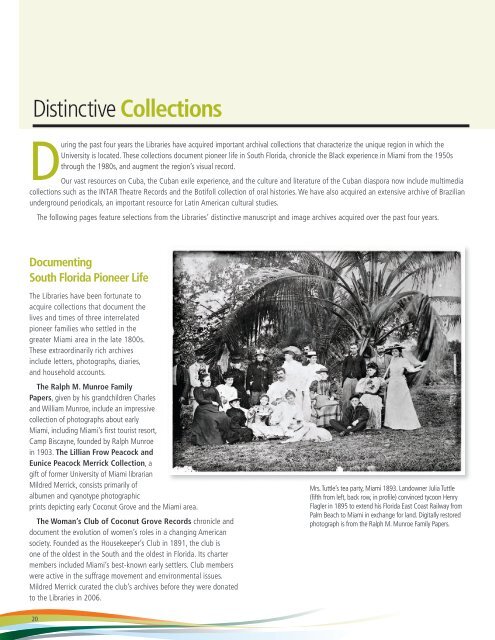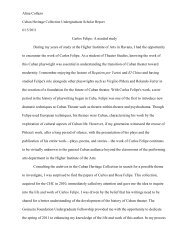Progress Report - University of Miami Libraries
Progress Report - University of Miami Libraries
Progress Report - University of Miami Libraries
Create successful ePaper yourself
Turn your PDF publications into a flip-book with our unique Google optimized e-Paper software.
Distinctive Collections<br />
During the past four years the <strong>Libraries</strong> have acquired important archival collections that characterize the unique region in which the<br />
<strong>University</strong> is located. These collections document pioneer life in South Florida, chronicle the Black experience in <strong>Miami</strong> from the 1950s<br />
through the 1980s, and augment the region’s visual record.<br />
Our vast resources on Cuba, the Cuban exile experience, and the culture and literature <strong>of</strong> the Cuban diaspora now include multimedia<br />
collections such as the INTAR Theatre Records and the Botifoll collection <strong>of</strong> oral histories. We have also acquired an extensive archive <strong>of</strong> Brazilian<br />
underground periodicals, an important resource for Latin American cultural studies.<br />
20<br />
The following pages feature selections from the <strong>Libraries</strong>’ distinctive manuscript and image archives acquired over the past four years.<br />
Documenting<br />
South Florida Pioneer Life<br />
The <strong>Libraries</strong> have been fortunate to<br />
acquire collections that document the<br />
lives and times <strong>of</strong> three interrelated<br />
pioneer families who settled in the<br />
greater <strong>Miami</strong> area in the late 1800s.<br />
These extraordinarily rich archives<br />
include letters, photographs, diaries,<br />
and household accounts.<br />
The Ralph M. Munroe Family<br />
Papers, given by his grandchildren Charles<br />
and William Munroe, include an impressive<br />
collection <strong>of</strong> photographs about early<br />
<strong>Miami</strong>, including <strong>Miami</strong>’s first tourist resort,<br />
Camp Biscayne, founded by Ralph Munroe<br />
in 1903. The Lillian Frow Peacock and<br />
Eunice Peacock Merrick Collection, a<br />
gift <strong>of</strong> former <strong>University</strong> <strong>of</strong> <strong>Miami</strong> librarian<br />
Mildred Merrick, consists primarily <strong>of</strong><br />
albumen and cyanotype photographic<br />
prints depicting early Coconut Grove and the <strong>Miami</strong> area.<br />
The Woman’s Club <strong>of</strong> Coconut Grove Records chronicle and<br />
document the evolution <strong>of</strong> women’s roles in a changing American<br />
society. Founded as the Housekeeper’s Club in 1891, the club is<br />
one <strong>of</strong> the oldest in the South and the oldest in Florida. Its charter<br />
members included <strong>Miami</strong>’s best-known early settlers. Club members<br />
were active in the suffrage movement and environmental issues.<br />
Mildred Merrick curated the club’s archives before they were donated<br />
to the <strong>Libraries</strong> in 2006.<br />
Mrs. Tuttle’s tea party, <strong>Miami</strong> 1893. Landowner Julia Tuttle<br />
(fifth from left, back row, in pr<strong>of</strong>ile) convinced tycoon Henry<br />
Flagler in 1895 to extend his Florida East Coast Railway from<br />
Palm Beach to <strong>Miami</strong> in exchange for land. Digitally restored<br />
photograph is from the Ralph M. Munroe Family Papers.



